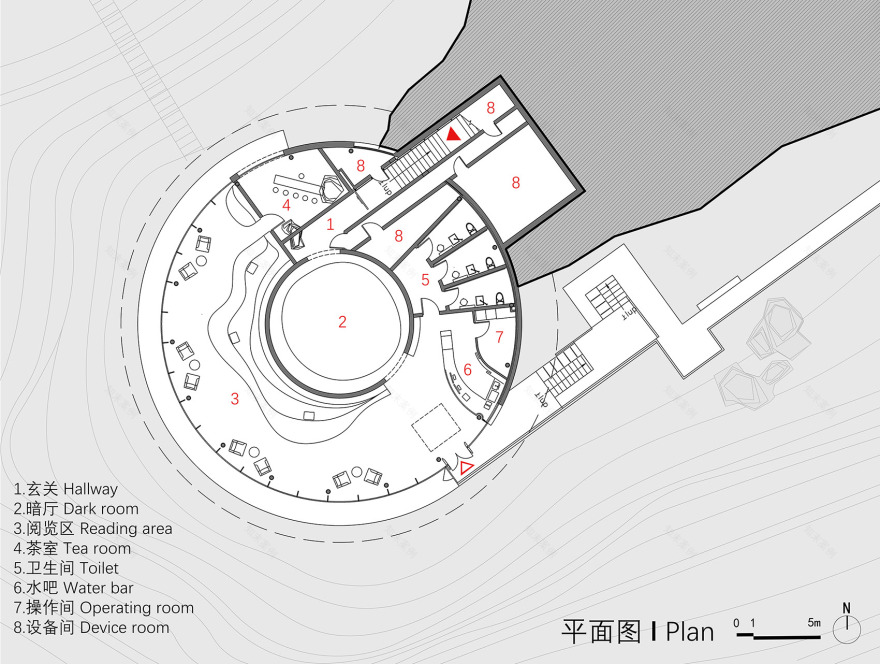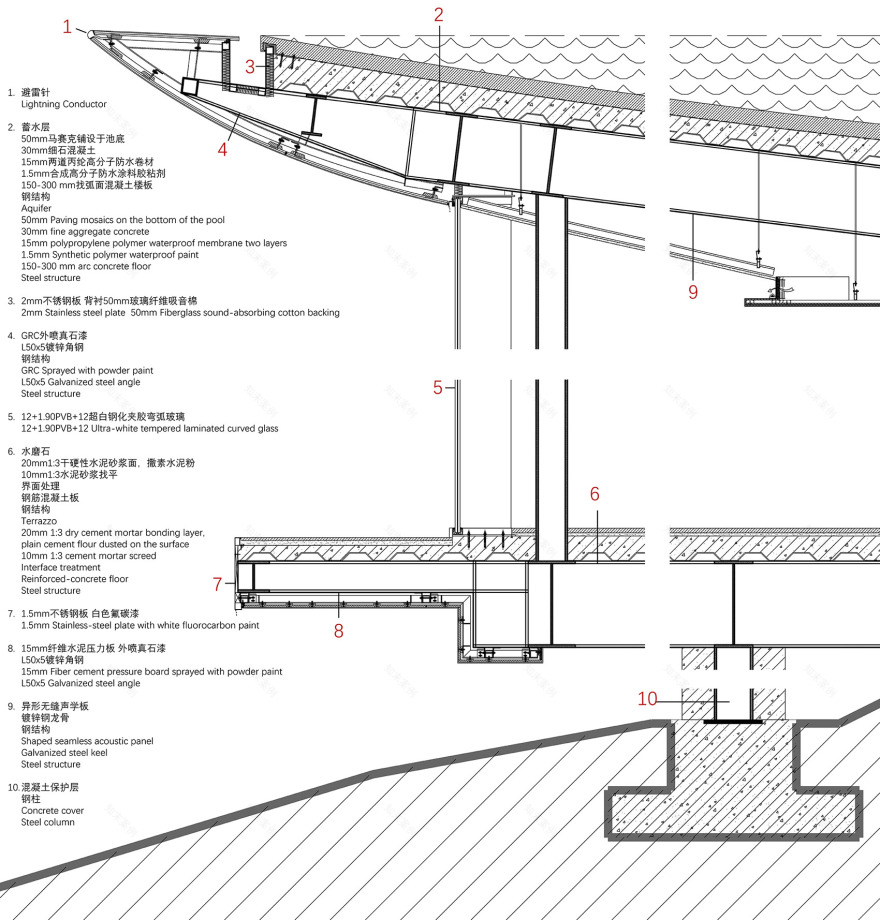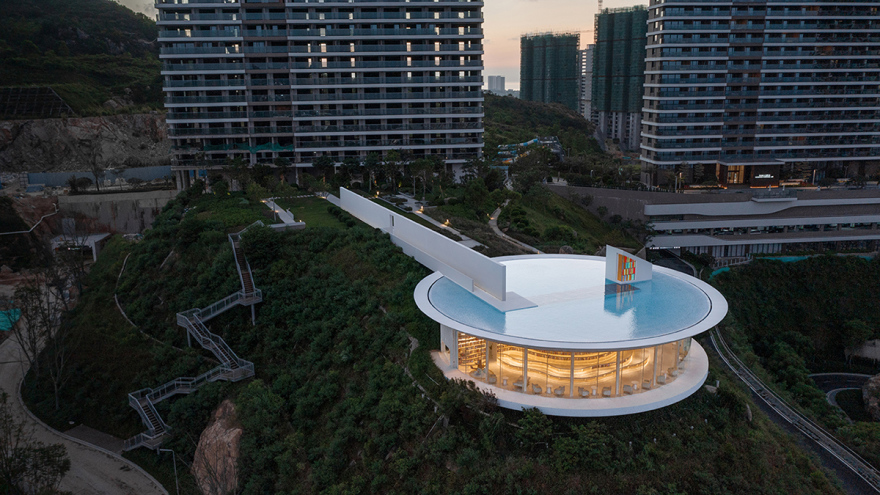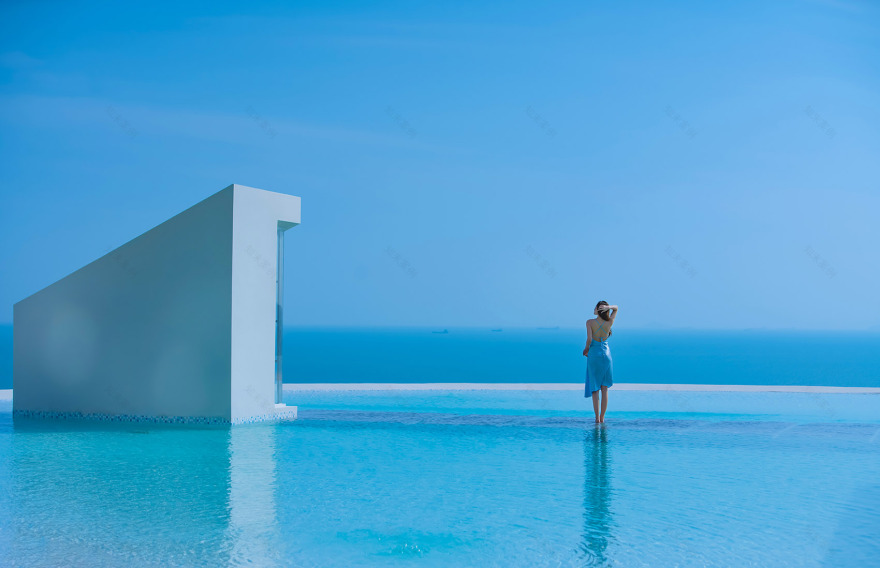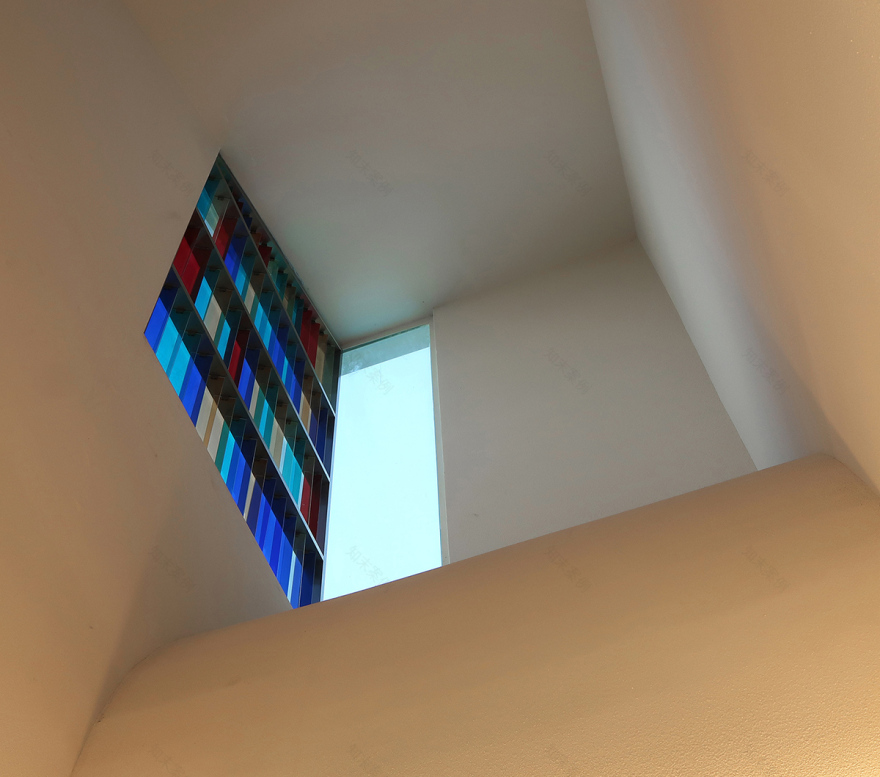查看完整案例

收藏

下载
场地条件:优势与挑战并存
Site conditions: advantages and challenges coexisting
建筑位于广东惠州市平海镇双月湾中央公园内。公园在平海古镇和大海之间,距离著名的双月湾海龟保护区不远。公园整体地形北高南低,北侧有丘陵和谷地,向南是大海。项目基地靠近公园中心,是一座独立突出的“半岛形”小山。山的走向从东北向西南,因此北面的视野以山丘和谷地为主,向南则是 270 度的海景,视线绝佳。公园内的山丘形态柔和,并不奇骏,但有若干巨石,为景观的塑造提供了重要的依托。
The building is located in Shuangyue Bay Central Park, Pinghai Town, Huizhou City, Guangdong Province, China. The park is between the ancient town of Pinghai and the sea, not far from the famous Shuangyue Bay Turtle Reserve. The overall terrain of the park is high in the north and low in the south, with hills and valleys in the north and the sea in the south. The project base is close to the center of the park and is an independent and prominent “peninsula shaped” hill. The trend of the hill is from northeast to southwest, so the view in the north is dominated by hills and valleys, and the view in the south is 270 degrees of excellent sea view. The hills in the park are soft in shape and not magnificent, but there are a number of boulders, which provide an important support for the shaping of the landscape.
▼项目概览
Overall view© 金伟琦
基地也存在挑战:基地东侧和东南侧有若干栋住宅楼,住宅高大的体量对建筑视线有一定的遮挡。此外,图书馆的高度必须严格控制,避免遮挡北侧住宅低层住户观看大海的视线。公园外围的西南方向有一栋多层建筑,外观并不理想,它也对图书馆的观海视线产生了负面的影响。
There are also challenges in the base: several residential buildings exist in the east and southeast of the base, and the high volume of the residence blocks the sight of the building to a certain extent. In addition, the height of the library must be strictly controlled to avoid blocking the sight of low-rise residents in the north side of the building to watch the sea. There is a multi-storey building in the southwest of the park, the appearance is not ideal, and it also has a negative impact on the sea view of the library.
▼建筑位于城市公园中,周边是新兴的社区,Building located in urban park and surrounded by emerging communities© 金伟琦
▼建筑嵌入场地,Building embedded into site© 金伟琦
选址和造型:一座白色的图书馆,它在池水之下 Location and shape: a white library under a pool of water
设计力求将图书馆的文化属性、场地的环境属性,及当代社会的公众属性融为一体。
建筑的位置被规划在山顶的端头,根据地形高差布置在崖口处。建筑与山体融为一体,成为场地的一部分。这样的处理既可以使图书馆具有最大的观景面,又在减少土方量的前提下最大限度的控制建筑的高度,不遮挡住宅的观海视线。
▼草图,Sketches© 三文建筑
The design strives to integrate the cultural attribute of the library, the environmental attribute of the site and the public attribute of contemporary society.
The location of the building is planned at the end of the mountain top and arranged at the cliff mouth according to the topographic height difference. The building is integrated with the hill and becomes a part of the site. Such treatment can not only make the library have the largest viewing surface, but also control the height of the building to the greatest extent on the premise of reducing the amount of earthwork, without blocking the view of the sea of the residence behind.
▼建筑漂浮在崖边,Building floating on the edge of cliff© 金伟琦
▼建筑位于山头,面朝大海 ,Building located on hill, facing the sea© 金伟琦
▼建筑与环境共生,Symbiosis between architecture and environment© 何崴
图书馆造型力求具有诗意的张力:从高处俯瞰,建筑很几何化——一个正圆+一条直线。
建筑主体部分平面形状为圆形,直线是室外走廊和长墙,它将人从山顶引入建筑。
图书馆整体为白色,走廊、长墙和屋顶的边缘强化了几何构成感。
建筑屋顶剖面呈碗形,阅读区的透明玻璃使屋顶具有悬浮感。
碗状的屋顶内是水池,它给予了建筑一种戏剧性——一座位于水下的图书馆。
The modeling of the library strives to have poetic tension: looking down from a high place, the building is very geometric – a circle plus a straight line. The plane shape of the main part of the building is circular, and the straight line is the outdoor corridor and long wall, which introduces people from the top of the hill into the building. The whole library is white, and the edges of corridor, long wall and roof strengthen the sense of geometric composition. The section of the building roof is bowl shaped, and the transparent glass in the reading area gives the roof a sense of suspension. Inside the bowl shaped roof is a pool, which gives the building a kind of dramatic implication – an underwater library.
▼建筑与场地的关系,Relationship between building and site
© 金伟琦
▼建筑呈现出几何构成感,Building presenting a sense of geometric composition
© 金伟琦
长墙的设置除了屏蔽掉场地西南方位的不利因素,还起到了导引的作用。它将人的视线导向水池和大海,并引导读者沿着这个特定的线路走近和走进建筑。在日落时分,会有那么几分钟,太阳在落入大海之前,夕阳会顺着长墙和走廊将人影拉长。这为建筑平添了浪漫的色彩。
The long wall not only shields the unfavorable factors in the southwest of the site, but also plays a guiding role. It guides people’s attention to the pool and the sea, and leads readers to approach and enter the building along this specific line. At sunset, before the sun falls into the sea, there will be a few minutes that the setting sun lengthens the shadows along the long wall and corridor. This adds a romantic color to the building.
▼从西北方向看图书馆,Library viewed from northwest© 金伟琦
▼长墙和水池,Long wall and roof pool© 金伟琦
▼长墙、水池和气窗,Long wall, roof pool and louver
© 金伟琦
空间序列:亮暗、开闭、曲直的交叠
Spatial sequence: overlapping of light and dark, opening and closing, circuitousness and straightness
进入图书馆的过程并不简单。因为建筑位于一座小山上,建筑师在山的北坡设计了一条曲折的路径。读者需要拾阶而上,在身体略显疲惫中体悟求学之苦,因此这里也称为“书山有径”。
到达山顶,映入眼帘的是笔直的走廊和长墙,它们以一种“强硬”的态度引导人朝向大海和建筑的方向。读者需要做的是遵从这个安排,被引导进入位于水下的图书馆。
The process of entering the library is not simple. Because the building is located on a hill, the architects designed a tortuous path on the north slope of the hill. Readers need to step up and understand the pain of learning in their slightly tired body. Therefore, it is also called “a path to the mountain of books”. When you reach the top of the mountain, you can see straight corridor and long wall, which guide people towards the sea and building with a “tough” attitude. What readers need to do is to follow this arrangement and be guided into the underwater library.
▼建筑隐藏在崖边尽头,Building hidden at the end of cliff© 双月湾地产
▼通向屋顶水池的通道被隐藏在长墙背后,Access to roof pool hidden behind long wall© 金伟琦
建筑主要的使用空间位于水池的下方,人进入建筑的过程是一次重新认识自然与自己的旅程。
进入建筑需要沿着室外长走廊下行,从水池下“潜入”。
The main use space of the building is located below the pool. The process of entering the building is a journey to reunderstand nature and oneself. To enter the building, you need to go down the corridor and “dive in” under the pool.
▼从下行通道进入建筑,Enter the building from downlink channel© 金伟琦
建筑师希望将室内营造为一组具有序列感的,亮与暗,开与闭交叠的戏剧性空间。人进入建筑的第一个场景是玄关,它位于室外走廊的尽头,这是一个相对狭小的过渡空间。从玄关左转,进入位于建筑中部的圆形空间,空间的界面朴素,具有禅意。建筑师希望这里是神秘的、暗的,它为进入阅读区域提供了前导,也可以在此举办一些小型的展览或者聚会。暗空间有“洞口”与阅读空间相连,后者位于建筑的外圈,是一个明亮的半环形空间。它具有近 270 度的落地玻璃,透明且开放,可以看到碧空和大海。
建筑的另一个出入口位于东南位置,人可以从这里离开图书馆,然后曲折的绕过场地中特意留下的巨石,回到山顶。
The architects hope to build the interior into a series of dramatic spaces with light and dark, opening and closing overlapping.
The first scene for people to enter the building is the porch, which is located at the end of the outdoor corridor, a relatively narrow transition space.
Turning left from the porch, you will enter the circular space in the middle of the building. The interface of the space is simple and meditative. The architects hope that this place is mysterious and dark. It provides a guide for entering the reading area. Some small exhibitions or parties can also be held here.
The dark space has a “hole” connected with the reading space, which is located in the outer ring of the building and is a bright semi-circular space. It has nearly 270 degrees of floor glass, transparent and open, through which you can see the blue sky and sea.
Another entrance and exit of the building is located in the southeast, from where people can leave the library and then bypass boulders in the site circuitously to return to the top of the hill.
▼玄关,Hallway
© 金伟琦
▼位于中间的暗厅,Dark room in the middle© 金伟琦
▼从暗厅回看玄关,Looking back at hallway from dark hall© 金伟琦
室内气氛:光、色、材料演绎空间主题
Indoor atmosphere: light, color and materials deducing the theme of space
阅读区的室内基调以白、浅灰等亮色为主,利用曲线的造型营造轻松、时尚的氛围。座椅和小桌沿着外围的玻璃幕墙摆放,读者可以在此安静的边阅读,边远眺风景。书架沿内壁环形布置,并在天花和地面区域向外延伸,形成类似云状的造型。延伸到地面部分也成为自由阅读的区域,一些不愿意正襟危坐的读者可以在这里或倚或靠,享受与书籍在一起的下午时光。
The indoor tone of the reading area is mainly white, light gray and other bright colors, and the curve shape is used to create a relaxing and fashionable atmosphere. Seats and small tables are placed along the outer glass curtain wall, where readers can read quietly and overlook the scenery. The bookshelves are arranged in a ring along the inner wall and extend outward in the ceiling and ground areas to form a cloud like shape. The part extending to the ground also becomes a free reading area, where some readers who do not want to sit upright can enjoy the afternoon time with books here, leaning or lolling.
▼位于中间的暗空间和位于外侧的亮空间,
Dark space in the middle and bright space on the outside
© 金伟琦
▼阅读空间,Reading space© 金伟琦
▼阅读空间可以看到大海,Sea viewable in reading space© 金伟琦
▼与自然共处的阅读,Reading in harmony with nature© 金伟琦
阅读区的两侧分别布置有两个独立的空间:VIP 茶室和卫生间。
VIP 茶室是一个内省的空间。室内延续了朴素的风格,布置有茶桌和座椅,可以独处,也可用于会谈。房间中特别布置了一块原石,人面石而坐,在看书品茗之余,也可近观山石之美。
卫生间则特意营造了戏剧性的效果,对比色和光纤装置都给人身体性的暗示。
Two independent spaces are arranged on both sides of the reading area: VIP tea room and rest rooms. The VIP tea room is an introspective space. The interior continues the simple style, with tea tables and seats, which can be used for solitude or for talks. The room is specially decorated with an original stone. Sitting while facing the stone, you can also have a close view of the beauty of mountain and stone while reading and drinking tea. For the rest rooms, a dramatic effect is specially created, and the contrast colors and optical fiber device both give people physical hints.
▼左:茶室空间;右:气窗上的彩色玻璃装置;Left: Tea house; Right: Stained glass installation on louver© 金伟琦© 何崴
水吧台位于卫生间和读书区之间,既分割了动静区域,又起到了过渡作用。吧台区域的天花部分有一个采光口,通往屋顶的水池。建筑师刻意在采光口朝向南侧的立面上设计了一个色彩装置。透过它,阳光被渲染为彩色光,以迷离的形式撒入空间,为建筑平添了几分妩媚。
The water bar is located between the rest rooms and the reading area, which not only divides the dynamic and static area, but also plays a transitional role. The ceiling part of the bar area has a light opening to the pool on the roof. The architects deliberately designed a color device on the facade on the south side of the daylighting opening. Through it, the sunlight is rendered as colored light, which is scattered into the space in a blurred form, adding a bit of charm to the building.
▼水吧 ,Water bar
© 金伟琦
水池与景观:人与大海、碧空的一次对话
Pool and landscape: a dialogue between man, the sea and the blue sky
项目的景观力求纯净。作为建筑的基底,山顶的植被以低矮的芒草和绿植为主,它们衬托出建筑干净的形体。场地中的几块巨石被小心的保留,并与路径结合在一起,成为观看建筑时候的前景。
The landscape of the project strives to be pure. As the base of the building, the vegetation on the top of the hill is mainly low awn grass and green plants, which set off the clean shape of the building. Several boulders in the site are carefully preserved and combined with the path to become the prospect while watching the building.
▼场地中的石头被保留,成为重要景观元素,Stones in the site preserved as important landscape elements© 双月湾地产
在山顶,白色的走廊和长墙成为自然景观中的人工物,纯粹的几何形体很好的吸引了使用者的注意力,并将人引向屋顶水池和大海的方向。
At the top of the hill, the white corridor and long wall become artifacts in the natural landscape. The pure geometric shapes well attract the attention of users and lead people to the direction of the roof pool and the sea.
▼越过屋顶水池可以看到海平面,Sea level viewable over roof pool© 金伟琦
▼长墙、气窗和圆形屋顶形成抽象的构成,
Long wall, louver and round roof forming an abstract composition
© 金伟琦
屋顶水池多少带有点乌托邦的成分。建筑师和业主都希望给使用者,乃至这个南方的小城市一些惊喜。客人可以沿着长墙北侧被隐藏的路径到达水池中的小平台,并通过汀步抵达同样位于水池中间的采光口及平台。水池边缘没有设置围栏,这确保了建筑的完整性和纯粹性。但建筑师利用汀步和平台周边的水深限制人进入水池,保证了安全性。从山顶的特定位置望去,视线可以掠过水面看到远处的海平面。水、天、海在此时此地得以融为一体。
The roof pool is somewhat with a utopian sense. The architects and owners hope to surprise users and even this small city in the south.
Guests can follow the hidden path on the north side of the long wall to the small platform in the pool, and reach the daylighting opening and platform located in the middle of the pool through the stepping stones on water surface.
There is no fence at the edge of the pool, which ensures the integrity and purity of the building. However, the architects used the stepping stones and the water depth around the platform to restrict people from entering the pool to ensure safety.
From a specific location on the top of the hill, people can see the sea level in the distance by glancing over the pool. Water, sky and the sea are integrated here and now.
▼屋顶水池允许人进入,Accessible roof pool© 金伟琦
▼水下汀步供人行走,Underwater stepping stones for walking© 金伟琦
结语:兼具身体体验和视觉传播的建筑
Conclusion: building with both physical experience and visual communication
这个图书馆的设计延续了三文建筑团队对景观性建筑一贯的设计理念。设计的起点从场地出发,建筑恰当的嵌入场地,但又具有存在感,并成为人与环境之间的连接点。建筑并不刻意追求自然拟形,简练的几何形彰显了作为人工物的抽象性,以及对环境的尊重。同时,这个建筑又是富于戏剧性和叙事性的,它并不刻意回避图像化和被传播。建筑师希望在现场身体体验和视觉传播两端,建筑都能胜任。
The design of this library continues the consistent design concept of 3andwich Design team for landscape architecture. The starting point of the design starts from the site. The building is properly embedded in the site, but it has a sense of existence, and becomes the connection point between people and the environment. Architecture does not deliberately pursue natural imitation. The concise geometry shows the abstraction as an artifact and respect for the environment. At the same time, the building is full of drama and narrative. It does not deliberately avoid visualization and dissemination. The architects hope that the building can be competent at both ends of on-site physical experience and visual communication.
▼图书馆服务周边新社区,Library serving surrounding new communities© 金伟琦
▼夕阳中的图书馆,Library in sunset© 金伟琦
▼建造过程,Construction process© 双月湾地产
▼总平面图,Site plan© 三文建筑
▼平面图,Plan© 三文建筑
▼南立面,South facade© 三文建筑
▼剖面,Section © 三文建筑
▼墙身大样剖面,Wall detail ©三文建筑
项目名称:一滴水图书馆
地点:广东省惠州市平海镇双月湾
业主:惠州市双月湾房地产投资开发有限公司
建筑及室内设计:三文建筑
主持建筑师:何崴、陈龙
项目建筑师:王梓亦(建筑)、孟祥婷(室内)
设计团队:周俊杰、万月潇、刘松、桑婉晨、刘泳、朱艳明、闫子明(实习)
结构顾问:潘从建
景观设计:TOPOS 景观建筑师事务所
照明设计:光筑国际照明设计(北京)有限公司
建筑面积:450 平方米
场地面积:3500 平方米
设计时间:2020 年 8 月-2021 年 4 月
建成时间:2022 年 4 月
摄影:金伟琦、何崴、惠州市双月湾房地产投资开发有限公司
Project name: Water Drop Library
Location: Shuangyue Bay, Huizhou City, Guangdong Province, China
Owner: Huizhou Shuangyue Bay Real Estate Investment and Development Co., Ltd.
Architectural and interior design: 3andwich Design / He Wei Studio
Principal architects: He Wei, Chen Long
Project architects: Wang Ziyi(architecture), Meng Xiangting(interior)
Design team: Zhou Junjie, Wan Yuexiao, Liu Song, Sang Wanchen, Liu Yong, Zhu Yanming, Yan Ziming(intern)
Structure engineer: Pan Congjian
Landscape design: TOPOS Landscape Architects
Lighting design: Guangzhu International Lighting Design Co. Ltd (Beijing)
Construction area: 450sqm
Site area: 3500sqm
Design time: Aug. 2020 – April 2021
Completion time: April 2022
Photography: Jin Weiqi, He Wei, Huizhou Shuangyue Bay Real Estate Investment and Development Co., Ltd.
客服
消息
收藏
下载
最近




































